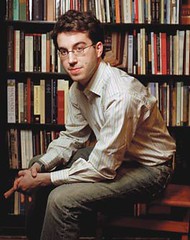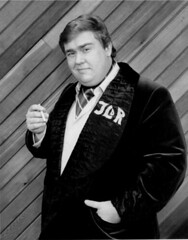
Editor's Note: this blog entry was written, like, a month ago. It might still be relevant to about six people in this world. If I were current, I would be writing about Raymond Carver, not writing about someone who wrote about Raymond Carver (see below).
But then the bedbugs revolted against the exterminator's poison, I fell into a state approaching depression, and hid in a cave. The bedbugs are still in my home, but I've left the cave. Or at least have stuck my toe out.
One of my all-time favorite literary takedowns was a full-bore, take-no-prisoners evisceration of Raymond Carver, once the resident patron saint of creative writing programs. The essay's point -- that Carver, through his unadorned and non-descriptive prose had ruined many an MFA student -- was crouched in harsh but convincing language.
The writer of that essay was a fellow by the name of Melvin Jules Bukiet, and if the name isn't familiar, the reason is that Bukiet hasn't sold many books. He teaches creative writing at Sarah Lawrence, and, if my intelligence serves me correctly, he was correct in ascertaining that Mr. Carver's banal language had produced a mini-generation of writers whose ambition was as flat as the "Carveresque" prose they proffered for workshop.
The reason I loved Bukiet's essay was that he was goring a sacred cow, and his venom had the ring of authenticity to it. I never understood why other writers loved Raymond Carver; reportedly, they saw in the late man the genius of hidden truth. What's not said, described, or done is more important than what is, according to his acolytes. His characters have a great secret to hide, or they have messed up relationships destroyed by booze and drugs. Or whatever.
That essay was in the Village Voice literary supplement, and clocked in at about 750 words. Now, Bukiet has penned an essay of greater length, though his prey is bigger: Brooklyn (N.Y.) writers.
Wonder this
He didn't mean writers who live exclusively in the Borough of Kings (though most of them do), but the type of fiction being produced by Brooklyn's leading literary lights, such as Paul Auster, Johnathan Safron Foer, and Myla Goldberg. The gist of the essay was "Brooklyn Books of Wonder" had become a species onto itself: cute, wondrous novels that divine suffering as a learning experience, when in fact, suffering just results in…suffering.
They often have juvenile protagonists and explicitly see the world through a child's eyes (Thus, the wonder, power, & glory).
Bukiet makes it sound like a world of solipsistic, self-satisfied Brooklynites who are one part Derrida, one part Leo Buscaglia, and one part Wally Lamb. One would think that by just crossing the Brooklyn Bridge you'd wandered into Literary Wonder Oblivion.
Knowing several of the species of Brooklyn Writer myself -- in geography if not temperament -- the essay was indeed provocative and had many salient points, but wasn't entirely convincing: a patina of personal disdain coats Bukiet's words of wisdom, as if Dave Eggers had committed the literary equivalent of diddling Bukiet's wife and was mocking the cuckold to boot.
Bukiet sets himself up way too easily for charges of professional jealousy, as it seems Foer sells more books in three hours than Bukiet has in his lifetime (not to mention money, or Foer's $5 million Brooklyn brownstone, or his movie advances, or…never mind).
I haven't read Bukiet's fiction, but though he sells few books, he is well-regarded. I did hear him read one of his stories, however, which involved a hotel, green shoes and a narrator obsessed with meeting perhaps the greatest of the great writers of English prose: Vladimir Nabokov.
Nabokov was many things, but Mr. Happy Ending was not one of them, and his stories could be as depressing as his prose was brilliant. And thus the answer to the problem.
Bukiet readily admits that these Brooklyn types are gifted writers, as far as putting beautiful sentences to paper. But they're wasting their estimable gifts.
The essay reads like Burgess Meredith yelling at Rocky. Bukiet doesn't want "The Lovely Bones." He doesn't want "Everything Is Illuminated." He wants "Crime and Punishments." He wants "Son of Lolita." But that ain't gonna happen: it's more likely that Nabokov himself will rise from the grave. And if it did -- and if there are books such as Buikiet wants -- they're selling fewer copies than "How to Blow Up Your Flight" at LAX.
But Bukiet even admits the greater point. Schlock sells, baby. The key sentence in the essay is All of these books instantly trigger the “Awww” reflex of narcissistic empathy that makes readers, adoring the proximate cause of their own sensitivity, buy them by the truckload. Narcissistic empathy or not, the greatest books often sell the fewest copies.
Foer: Straight outta Bed-Sty
Love or hate A Heartbreaking Work of Staggering Genius, it sold a ton of books despite its intellectual pretensions, not because of them. (Ditto "Everything Is Illuminated," "The History of Love," etc.).
And in an era in which almost nobody is awaiting a new novel by fill-in-the-blank writer as they did once with Bellow and Roth, at least these Oprah-fied fill-ins did something that most fiction with highbrow pretensions almost never does anymore: people read 'em, critics take them seriously, and they strike a cord with a mass audience. Which is more than can be said for...oh, never mind.
Friday, October 19, 2007
Son of Lolita
Subscribe to:
Comment Feed (RSS)


|